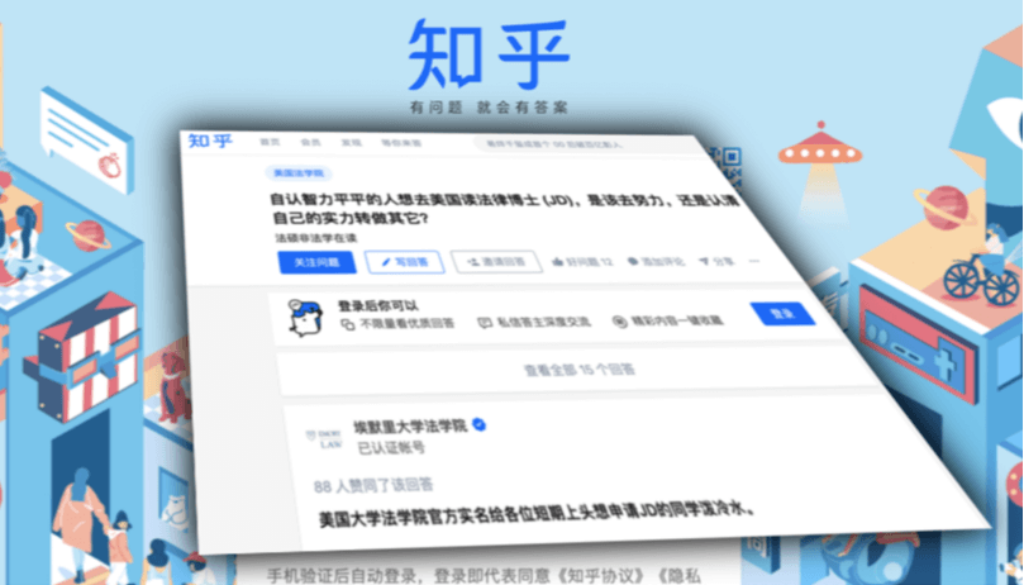Zhihu Answers – How to Write a Great First Sentence
Zhihu is THE Q&A platform in China. Over 200 million users visit the platform each month to find reliable answers on all sorts of topics.
Let me begin by briefly explaining why some companies should use Zhihu, then I’m going to dig into one very important part of each answer—the first sentence.
Table of Contents
Which Companies Should Use Zhihu?
At my agency, Nanjing Marketing Group, we use Zhihu to promote B2B companies and educational institutions. The types of “products” these organizations sell are complex, and the purchase cycle can be long and convoluted.
For example, when a student considers where to study abroad, it is a major decision. They will consider this decision for at least several months, but very likely several years. It isn’t easy for a person to decide what type of career they want, let alone compare different study locations, understand immigration policies, figure out how to apply, etc.
So students will do research online—a LOT of research online. This includes searching for high-quality knowledge on places such as Baidu, Xiaohongshu, WeChat, and Zhihu.
Zhihu is great for educating buyers who are studying up before making a large, important purchase.
As a bonus, Zhihu has Baidu as one of its investors, which means that Zhihu content tends to rank very highly on Baidu search as well.
Writing the First Sentence
The thing about Zhihu marketing is that it’s not easy. Valuable questions will attract plenty of authors to answer. Better answers are voted up, while lesser answers fall down towards the bottom.
To make Zhihu work for your company, you’ll need both the expertise and the writing skills.
When it comes to writing, one of the most important parts of the answer is the first sentence.
Zhihu users, like everyone else in the world, have access to all the information of the Internet. When they search for a topic on Zhihu, they’ll click the question, then scroll up and down the page. Almost nobody simply reads the page from top to bottom like they would do a novel.
So the top few answers will get eyeballs, but only some of those answers will grab the readers’ attention and motivate them to read on. The first sentence is the first thing they’ll see, so it’s important to make it really catchy.
I found one such catchy answer produced by our team earlier this week. (Click here to see the Chinese-language answer.)

It’s in response to a question on Zhihu that asks:
“自认智力平平的人想去美国读法律博士 (JD),是该去努力,还是认清自己的实力转做其它?”
This means:
“For those of us with an average intelligence level that want to do a Juris Doctor degree (JD) in the USA, should we try to get in or put our efforts into another field instead?”
For our client Emory University School of Law, this is a great question because some people now considering applying to study law in USA will read this, and some of them will apply to Emory.
The first sentence of the answer we posted is
“美国大学法学院官方实名给各位短期上头想申请JD的同学泼冷水。”
It means:
“This US law school official account is here to pour some cold water on the plans of any student that wants to apply to study for a JD in the short term.”
The answer has been getting thousands of views and has 88 upvotes so far (it had 79 upvotes when I made the YouTube video a couple of days ago).
It’s currently in third place. If it stays there or moves up, it will continue to bring in plenty of organic traffic over the long term.
Here are a few tips I derived from this specific sentence.
Show credibility.
It says the answer is from a US law school. That’s a lot better than an anonymous user, isn’ t it?
Plus, the Zhihu account is an official verified account, which is indicated by the blue check mark. So readers know they’re getting reliable information.
Use keywords from the question.
One keyword that stands out in the question and answer is “JD.” It’s the only English initialism in the sentence and it’s the specific degree readers want to learn about.
State who it’s for.
When people are scrolling around, they’re looking for content that is specific to them. So it helps to state directly in the first sentence who it’s for.
In this case, the answer is for students/classmates.
Use emotion.
If the first sentence causes the reader to feel something, they’re more likely to read on. While the topic itself can drive an emotional reaction, using some descriptive language can also help.
Here, we used the phrase “pour cold water on” to create a more dramatic visualization.
Hint at more.
The sentence should urge the reader to read on to get more.
In the above example, the sentence hints that there’s more to the story by qualifying that those that hope to study law in USA in the short term shouldn’t really have their hopes up.
The reader might think: But how short term? Do I have time to prepare? Also, why is a US law school coming on Zhihu and telling us that we probably shouldn’t apply for US law school?
About Writing
It would be great if I could teach everybody to write excellent content in Chinese.
But, truthfully, even I can’t compete with the creative prowess of the Chinese writers on our team, and I’ve studied Chinese for over twenty years.That being said, I know great content when I see it.



